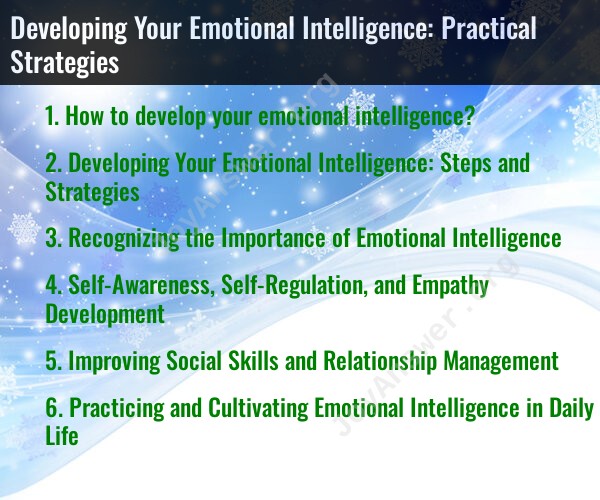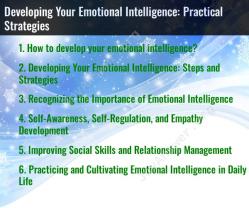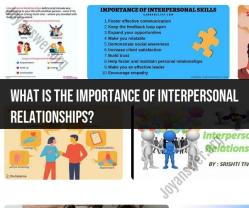How to develop your emotional intelligence?
Developing emotional intelligence (EQ) is a valuable skill that can enhance your personal and professional relationships, increase self-awareness, and improve your ability to manage emotions. Here are practical strategies to help you develop your emotional intelligence:
Self-Awareness:
Practice Mindfulness: Mindfulness involves being fully present in the moment and observing your thoughts and emotions without judgment. This can enhance self-awareness.
Keep a Journal: Regularly journaling your thoughts and feelings can help you become more in tune with your emotions and identify patterns.
Seek Feedback: Ask for feedback from trusted friends, family, or colleagues about how they perceive your emotions and behavior.
Self-Regulation:
Stress Management: Learn stress reduction techniques such as deep breathing, meditation, or physical exercise to help regulate your emotional responses.
Pause Before Reacting: When faced with a situation that triggers a strong emotional response, take a moment to pause and consider your reaction before responding.
Conflict Resolution: Develop conflict resolution skills to handle disagreements and difficult conversations calmly and constructively.
Empathy:
Active Listening: Practice active listening by fully focusing on what others are saying, asking clarifying questions, and showing that you understand their perspective.
Put Yourself in Their Shoes: Try to understand how others may be feeling by imagining their perspective and emotions.
Cultivate Curiosity: Be genuinely curious about others and their experiences, and ask open-ended questions to learn more about them.
Social Skills:
Practice Effective Communication: Work on your communication skills, including non-verbal communication, to convey your thoughts and emotions clearly.
Develop Interpersonal Skills: Build strong interpersonal relationships by being cooperative, respectful, and supportive of others.
Conflict Resolution: Enhance your ability to resolve conflicts and negotiate effectively with others.
Emotion Recognition:
Improve Your Vocabulary: Expand your emotional vocabulary to better identify and express your feelings.
Observe Non-Verbal Cues: Pay attention to non-verbal cues such as facial expressions, body language, and tone of voice to better understand the emotions of others.
Empathy Exercises: Practice exercises that involve recognizing and naming the emotions of people in various situations.
Emotion Management:
Emotion Regulation: Develop strategies for regulating your emotions when they become overwhelming. This may include deep breathing, positive self-talk, or taking a break.
Channel Emotions Positively: Find healthy and constructive ways to channel your emotions, such as through creative activities, physical exercise, or sharing your feelings with someone you trust.
Seek Support: If you're struggling with emotional challenges, don't hesitate to seek support from a therapist or counselor.
Continuous Learning:
Read and Study: Invest time in reading books, articles, or attending workshops that focus on emotional intelligence and self-awareness.
Reflect on Experiences: Regularly reflect on your interactions and emotional responses to learn from your experiences.
Developing emotional intelligence is an ongoing process that requires self-reflection, practice, and a commitment to personal growth. It can lead to more fulfilling relationships, improved conflict resolution skills, and greater self-awareness. Remember that progress may take time, so be patient with yourself as you work on enhancing your emotional intelligence.
Developing Your Emotional Intelligence: Steps and Strategies
Emotional intelligence (EI) is the ability to understand and manage your own emotions, as well as the emotions of others. It is a critical skill for success in personal and professional life.
Here are some steps and strategies for developing your emotional intelligence:
Recognize the importance of emotional intelligence. EI is important for building strong relationships, making effective decisions, and managing stress. It can also help you to achieve your goals and live a fulfilling life.
Become more self-aware. Self-awareness is the foundation of emotional intelligence. It involves understanding your own emotions, triggers, and values. You can develop self-awareness by journaling, meditating, and practicing mindfulness.
Develop self-regulation. Self-regulation is the ability to manage your emotions and behaviors in a healthy way. It involves being able to calm down when you are feeling angry or upset, and to delay gratification when necessary. You can develop self-regulation by practicing relaxation techniques and setting realistic goals.
Develop empathy. Empathy is the ability to understand and share the feelings of others. It is important for building strong relationships and resolving conflict. You can develop empathy by practicing active listening and putting yourself in others' shoes.
Improve your social skills. Social skills are the skills you use to interact with others. They include communication, teamwork, and conflict resolution. You can improve your social skills by practicing them in everyday situations and by seeking feedback from others.
Practice and cultivate emotional intelligence in daily life. EI is a skill that takes time and practice to develop. Here are a few tips for practicing and cultivating EI in daily life:
- Pay attention to your emotions. Notice how you feel throughout the day and try to identify the triggers that cause certain emotions.
- Take breaks when you need them. If you are feeling overwhelmed or stressed, take a few minutes to relax and clear your head.
- Be mindful of your communication. Pay attention to your body language and tone of voice, and try to communicate in a clear and respectful way.
- Be assertive. Assertiveness is the ability to communicate your needs and wants in a respectful way. It is important for maintaining healthy relationships.
- Be forgiving. Holding on to grudges and resentment can damage your relationships and your own emotional health. Learn to forgive yourself and others.
Recognizing the Importance of Emotional Intelligence
EI is important for success in all areas of life, including personal relationships, professional relationships, and academic achievement.
Here are some of the benefits of having high EI:
- Stronger relationships: EI helps you to build and maintain strong relationships with others. It allows you to understand and respond to their emotions, and to resolve conflict effectively.
- Better decision-making: EI helps you to make better decisions by considering the emotional consequences of your choices.
- Effective stress management: EI helps you to manage stress more effectively. It allows you to identify and manage your triggers, and to cope with difficult situations in a healthy way.
- Improved academic achievement: EI has been shown to improve academic achievement in students of all ages. It helps students to stay motivated, to manage their stress, and to resolve conflicts with their peers and teachers.
Self-Awareness, Self-Regulation, and Empathy Development
Self-awareness, self-regulation, and empathy are the three key components of emotional intelligence.
Self-awareness is the ability to understand your own emotions, thoughts, and behaviors. It also involves understanding your strengths and weaknesses, and your values.
Self-regulation is the ability to manage your emotions and behaviors in a healthy way. It involves being able to control your impulses, delay gratification, and cope with difficult situations.
Empathy is the ability to understand and share the feelings of others. It involves being able to put yourself in someone else's shoes and see the world from their perspective.
You can develop self-awareness, self-regulation, and empathy by:
- Keeping a journal: Journaling can help you to identify and understand your emotions, thoughts, and behaviors.
- Practicing mindfulness: Mindfulness is the practice of paying attention to the present moment without judgment. It can help you to become more aware of your thoughts,





